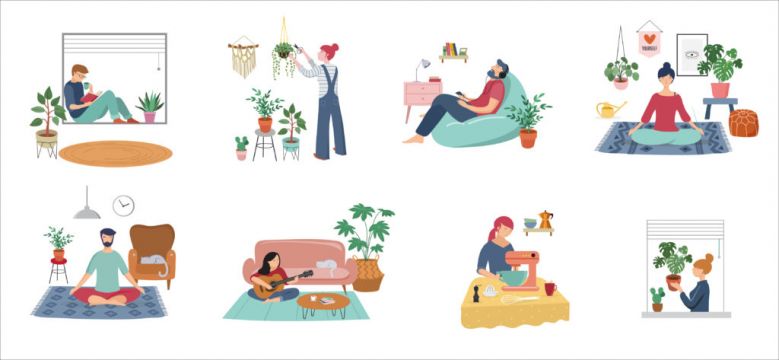There’s lots to consider when you’re looking for a place to rent. Finding the ideal shared or rented home can be a stressful and competitive process, with pressure to compromise and make decisions fast.
But, not having a mortgage or owning your home really shouldn’t mean your personal wellbeing drops to the bottom of the priority list.
As this past year has highlighted, our homes are the bedrock of our mental health – and renters have the right to a safe haven as much as anyone else.

So, next time you’re on the hunt for a new rented home, or perhaps supporting a grown-up child in the process, while budget, bills and transport links may be driving your search, don’t forget to add wellbeing factors into your checklist too.
Here are five key questions for your renters’ wellbeing checklist…
1. Is there green space nearby?
Are there places nearby where you can go for walks, where there’ll be greenery, trees, water – some sort of nature? Lockdown’s really shown just how much of a sanity-saver it is to be able to get outside for a nature fix and fresh air. Hopping on a train for a day in the countryside every now and then is one thing, but it’s the day-to-day that really matters.
“This would be number one in my checklist,” says psychologist and wellbeing expert Suzy Reading, author of Self-Care For Tough Times. “Research shows that nature therapy is a potent antidepressant, a really helpful way to calm our nerves, to soothe, to heal and replenish.”

2. Is there adequate storage space?
This might seem like an odd one to include – but as someone who’s racked up two decades of renting, the importance of storage options has grown monumentally over the years.
I’m not just talking about the size of the wardrobe in your bedroom – think about whether this is a home where you’ll be able to spread your belongings out in the lounge, prop your bike in the hallway, display your books and whatnot.
Having to cram everything into a bedroom is really not a recipe for great wellbeing, and not how you want to be living. There is a key difference between ‘renting a room’, and ‘renting a home’.
3. Is there a bath tub?
For me, this is essential – I love baths. But if baths aren’t that big a deal to you, think of this as more of a symbolic nudge to consider whether the property feels like a good fit for whatever self-care, and a homely environment, means to you.

“It prompts the question, is this environment conducive to my wellbeing? Can I relax here? Does it give me access to opportunities to relax? That might also prompt questions like, is there enough natural light? Do I feel at ease here?” says Reading. “Our home is our sanctuary, so it is about giving ourselves permission to factor wellbeing as an important part of the house-hunting process.”
4. Is there good communication with the landlord/lady or letting agent?
I’ve had my share of rubbish landlords/agents and it’s extremely stressful. Just as they will expect references off you as a tenant, allow yourself to consider whether they seem like decent people, and if good lines of communication are in place.
“Renting can be stressful and almost feel disempowering, as it’s up to the landlord or agent to make sure your living conditions are maintained. What we are talking about here is safety, as if you don’t feel safe in your home, then you will not feel motivated in other parts of life,” says psychologist Philip Karahassan. “If you don’t have that line of communication with your landlord, you won’t feel safe, and may also become disengaged with your home.”
5. Is there enough actual living space?
It’s not uncommon for rented homes to have no designated living space – like a lounge and dining area – because all the rooms are being rented as bedrooms, especially for younger renters with tight budgets.

Of course, it would be great if there were greater protections against this, and people weren’t forced to choose between their wellbeing or living somewhere they can afford. But as tempting as the cheapest rent may be, this is something to think carefully about.
“We need to feel that home is a restful, safe space which we have control over, so we can relax and unwind. Otherwise, you aren’t able to take that much-needed rest after a long day, and can’t mentally and emotionally prepare for the following day,” says Karahassan. “This links back to self-esteem, which needs to be nurtured, by having your social needs being met.”
Another factor here is not being able to build boundaries around your sleeping space and the rest of your life, especially if you’re also working from home – so don’t overlook the importance of a home that really does function like one.







